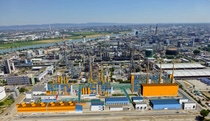Media
BASF to replace acetylene plant in Ludwigshafen
- World’s most efficient production process
- Strengthens Ludwigshafen Verbund site
- Improves competitiveness in many markets
BASF is building a world-scale production plant for acetylene at its Ludwigshafen site. The plant will start up at the end of 2019 and replace the existing plant. The new facility will have the capacity to produce 90,000 metric tons of acetylene per year and will use the world’s most efficient production process. Around 20 production facilities at the Ludwigshafen site use acetylene as a starting material for many other products and value chains.
“With the new plant, we are strengthening the BASF Verbund by ensuring an efficient supply of the key intermediate acetylene at our Ludwigshafen site. This will improve our competitiveness and support growth in the various acetylene value chains,” said Dr. Stefan Blank, President of the Intermediates division. “We have been working on acetylene production for more than 50 years and have continuously refined the associated processes during this time. Accordingly, the new plant in Ludwigshafen will use state-of-the-art technical equipment and processes.”
“As an important starting material for many BASF products at the Ludwigshafen site and for products produced by our customers, acetylene is very important to BASF. Integrating this plant within our Verbund approach offers advantages such as efficient use of resources, excellent production synergies and short supply routes. This will further enhance the long-term competitiveness of our Ludwigshafen site,” said Dr. Uwe Liebelt, head of the BASF Ludwigshafen Verbund site.
With its modern production process, the plant will strengthen the BASF Verbund in Ludwigshafen. The process uses raw materials very efficiently. Furthermore, the heat given off during production will be used to generate energy. The end-product yield is higher and by-products are used efficiently.
As a chemical component, acetylene has a diverse range of applications. It is an important starting material for many everyday products, including pharmaceuticals, plastics, solvents, electronic chemicals and highly elastic textile fibers. BASF customers use these products in the automotive, pharma, construction, consumer goods and textiles industries. BASF has also operated an acetylene plant at its Verbund site in Geismar, Louisiana, since 2000.
BASF chemist the founder of acetylene chemistry
The production and processing of acetylene is closely connected with the name Walter Reppe (1892-1969), a BASF chemist who is considered the founder of modern acetylene chemistry. His goal was the large-scale use of acetylene for plastic production. Working towards this goal, he first found a way to work safely with the highly flammable and reactive acetylene gas under high pressure. Based on this, he conducted research in the 1930s on four fundamental chemical reactions with acetylene that can create a wide variety of chemical compounds. This chemistry pioneer thus paved the way for the production of countless products that contribute to today’s quality of life. Further information and background available at http://www.basf.com/acetylene.
About BASF Intermediates
The BASF Group’s Intermediates division develops, produces and markets a comprehensive portfolio of about 700 intermediates around the world. Its’ most important product groups include amines, diols, polyalcohols, acids and specialties. Intermediates are for example used as starting materials for coatings, plastics, pharmaceuticals, textiles, detergents and crop protectants. Innovative intermediates from BASF help to improve both the properties of final products and the efficiency of production processes. The ISO 9001 certified Intermediates division operates plants at production sites in Europe, Asia and North America. Around the globe the division generated sales to third parties of about €2.8 billion in 2015. Further information at www.intermediates.basf.com.
About BASF
At BASF, we create chemistry for a sustainable future. We combine economic success with environmental protection and social responsibility. The approximately 112,000 employees in the BASF Group work on contributing to the success of our customers in nearly all sectors and almost every country in the world. Our portfolio is organized into five segments: Chemicals, Performance Products, Functional Materials & Solutions, Agricultural Solutions and Oil & Gas. BASF generated sales of more than €70 billion in 2015. BASF shares are traded on the stock exchanges in Frankfurt (BAS), London (BFA) and Zurich (AN). Further information at www.basf.com.
P-16-311

